Keyword Research Strategy: A Comprehensive Beginners Guide
Posted on 2023-11-16
Introduction
There is never a reason to stop improving your keyword research strategy. Here, we'll direct you to the next step of its evolution.

Keywords are both the building blocks of search engine optimization and a vital part of the targeting systems of ad campaigns. They determine whether or not your website ranks on different search engines, and whether your ads are delivered to the relevant audiences.
It is hard to overestimate the importance of learning how to conduct proper keyword research. Choosing the wrong keywords can easily make you waste a lot of your precious time, effort, and budget. On the other hand, the right choice of keywords increases your chances of ranking high on the first search engine results page and reaching prospective customers.
Luckily, keyword research is not hard to do. Once you understand the process, you can integrate it into creating your site's content. This article will guide you through every step of the keyword research process both for building your website (SEO side) and targeting your ad campaigns.
What is a Keyword?

Keywords are single words or phrases that are used in content to make them easier to find. These keywords are implemented to improve search engine results page visibility and user engagement.
Meaning of Keyword Research for SEO?

Keyword research is how you learn what words, questions, and phrases that people are looking for. This is also the process of figuring out the target keywords that are relevant to your website and its pages. Keyword research can help you find questions to answer, what words you can rank for and more.
Why is Keyword Research Important?
Effective keyword research helps you find all the relevant keywords to focus on. When conducting keyword research, you get information about what your target audience is actually looking for on Google. You can use the information you get from these actual search terms to help guide your content strategy and your overall marketing strategy.
When people do research online, they use keywords to find answers. So, if your audience is able to find your content when they are searching, you could get more traffic. Below, we have explained the benefits of keyword research.
Analysis of Current Marketing Developments
An understanding of the current marketing trends and the topics and phrases your target audience is actively seeking can be deduced from thorough keyword research. This helps you create better content with better chances of appearing on the first page of different search engines.
Growth in Traffic

Better search engine rankings mean more visitors to your website. Therefore it's important to choose the right keywords before publishing new content.
Acquiring New Customers
If you have content that is useful to individuals that go to Google for a solution, you can fulfill their informational needs. Then, with the right marketing strategy, you entice them to take the next step in the buyer's journey, moving them closer to making a purchase.
You can address the questions that most of your target audience has by doing keyword research. With this, you see the best keywords that are most frequently searched for and learn the overall intent behind those searches.
Elements of Keyword Research

There are basic things to keep in mind when carrying out keyword research. Though we shall go into more detail on some of these elements, here is an overview of what they entail:
Monthly Search Volume
Monthly Search Volume (MSV) is a popular metric for evaluating the worth of keywords. It's a good starting point, but these are not the only keywords that you should be using.
A keyword may not be the best one for you to rank on just because it has a high MSV. As a rule, the higher the MSV, the bigger the competition. And this is not a battle you can hope to win every time.
That's why you blend them with a mix of low-volume, low-difficulty keywords. With this, your content can get to the right audience whenever the relevant keywords are searched for.
User Intent
To put it simply, user intent is the desired outcome of search queries. There are two main reasons why understanding user intent is crucial.
First, the material and pages you build for a website should be focused on answering the questions your visitors have. You're wasting your time if you make a page focused on your own interests; your user cares solely about their own problems and demands.
If a user who types in "pizza” is looking for a recipe for pizza, they won't click on your link if it doesn't have it, even if the website has the best content in the history of pizza.
Second, Google prioritizes results based on relevancy. As a result, your page's rank may improve if it is more relevant to the user's intended purpose.
Long Tail Keywords
Long tail keywords are all on the right side of the search demand curve. For clarification, the search demand curve is a graph that shows keywords that get a lot of searches on the left. It shows the keywords that get fewer searches on the right.
Longer, more specific searches fall to the right. Head terms that are used a lot and have a broad meaning fall to the left.
Long-tail keywords are valuable since they tend to be very particular search terms that perform well in terms of conversion. That's because people are using them to perform very targeted searches.
Since long-tail keywords tend to be less competitive, they are a great addition to any keyword strategy. The number of long-tail keywords adds up to largely focused traffic, making them a good option for upcoming brands.
Relevance
Google's algorithm always considers how often users click on related links when deciding which pages to show in its search results. For instance, when it processes a search like "cupcake," Google needs to decide whether the user is looking for something specific.
For instance, it might consider whether the person wants the definition of a cupcake, instructions for making cupcakes, or cupcakes they can buy. Therefore, it helps to check out the search results page for each keyword you have as they can provide user intent.
How You Can Research Keywords for Your Brand

Creating a keyword research strategy isn't as difficult as it seems. Here's a simple guide on how to research the keywords that will suit your business.
- Make a list of your company's offers
- Add keywords to your topic buckets
- Learn how the user's intent affects your keyword research
- Look up relevant keywords
Make a List of Your Company's Offers
The first thing to do is to classify the many aspects of your main keywords into different categories. You will first identify five to ten topics that are relevant to your company's success. With this, you can develop relevant keyword ideas that you can infuse into your online platform.
For instance, if you write a blog, you likely have favorite subjects that you enjoy writing about most often. However, you shouldn't just focus on the subjects you like the most; you have to consider what your audience will like to read.
Check what your customers would be looking for if they were searching for your product or service. Then, you'll be able to draw up a list of the most-searched topics that will drive traffic to your site.
Add Keywords to Your Topic Buckets
It's time to determine some keywords that fit within the topic buckets you've chosen to concentrate on. These are keyword phrases that you believe are crucial to rank for in the SERPs since your target audience is likely searching for them.
Adding these phrases and words to your topic bucket is not where you get your final list of related keywords. You just want to come up with a list of words and phrases that you believe future clients could use to look for content under that specific topic bucket.
Note that Google is encrypting more and more keywords every day. Still, you can get ideas for keywords by looking at the keywords that people already use to find your site. To do this, you'll need software like Google Analytics.
Explore the sources of traffic to your website. Then, sort through your organic search traffic to find the keywords people are using to find your site. Do this task for as many topic buckets as you have.
Learn How the User's Intent Affects Your Keyword Research
User intent is one of the things that determines how well you rank on Google and other search engines. It is more important for your web page to help with the problem a person was trying to solve than for it to have the particular keyword the searcher used.
It's easy to prioritize keywords at face value, but beneath the surface, they can mean many different things. Since a search is so important to your ranking potential, you need to be careful of how you interpret and use the keywords you target.
Look Up Relevant Keywords
For some topics, coming up with additional search terms that people might use can be difficult. If that's the case, you should check out the suggested Google searches that follow the first query.
The suggestions for related searches appear at the bottom of the page when you enter your term and scroll down. These keywords may give you ideas for further terms you might want to research. In the following section, we explore other means by which you can get keyword ideas.
Best Ways to Find Keywords
There are different ways to find seed keywords, and we've explained these methods below.
Get Your Seed Keywords
Your keyword research strategy begins with getting a set of seed keywords. These words or phrases help you define your niche and identify your competitors.
Furthermore, keyword research tools will request a seed term. It's this seed keyword that it uses to produce a massive list of keyword suggestions.
Finding seed keywords is simple, especially if you already have a service or business that you want to market online. Just consider the search terms consumers would use to find what you have to offer. For instance, if you run a fashion brand, your seed keyword could be "jeans," "office wear," and the like.
Keep in mind that seed keywords aren't valuable enough to target with web page content. They will serve as "seeds" for the next stages of your research.
Therefore, try not to get too fixated on your seed keywords. Finding them should only take a little while. You can move on to the next phase as soon as you have a few general concepts linked to the subject of your website.
Check Out Your Competitors' Keywords
As already mentioned, keyword research involves getting relevant search terms that relate to your search. One of the best ways to do this is to learn what keywords make your competitor rank.
Your list of potential keywords will come in handy at this point. Try typing in one of your seed keywords into Google and see who comes up first. If the highest-ranking sites for your seed keywords don't have much in common with your site, then narrow your search.
For instance, imagine that you own a website that sells coffee-related products. You might learn that there's more direct competition if you optimize your site for the search term "cappuccino maker" rather than just "cappuccino." This is due to the fact that search results for the former are dominated by online shops like yours, while search results for the latter are dominated by blogs.
The moment you locate a website that is a good match, you should use keyword research tools to analyze keywords in its content. With this, you'll see which pages bring the most traffic and what keywords these pages are targeting. After doing this with a few of your competitors, you'll have a pretty long list of keywords that are relevant to your business.
Use Keyword Research Tools
Competitors are an excellent place to find keyword suggestions. However, it's highly possible that there are still a lot of keywords that your rivals haven't yet optimized for. You can find these extra phrases and words by using keyword tools.
All keyword research tools operate in the same manner. You provide a seed term, and then they use that keyword to generate keyword suggestions from their databases.
The most well-known keyword tool is probably Google Keyword Planner (GKP). You can use it for free to find keywords for SEO even though it was designed for people who wish to display paid advertisements on Google. Besides GKP, there are other tools you can use, and we shall discuss them later in this text.
Study Your Niche
With the information we've covered so far, you can come up with an almost infinite amount of organic keywords. However, you might be generating keywords that are applicable to different sections of the industry you operate in. It's important to niche down so you can know the right keywords that are applicable to your brand.
You can tackle this problem by visiting industry-specific online discussion boards, groups, and question-and-answer sites. From these forums, you get a good idea of the specific keywords that your clients look for when they visit the internet.
Interacting with your current clientele can be just as helpful as using industry message boards. Pay close attention to the questions and words they frequently use the next time you interact with them. You could get some fresh ideas for topics to write about on your site based on the keywords that come up.
How to Analyze Your Keywords
With the steps above, you'll have a boatload of keywords to use. While this is great, incorporating all relevant phrases into your site is a difficult task. Plus, considering the volume, manually reviewing them would be an enormous hassle.
You just need to use search engine optimization (SEO) measures to whittle down your term list and pick out the best ones. To that end, let's take a look at four different keyword metrics.
Keyword Difficulty
This is another essential metric for analyzing your keyphrases. SEO experts with a lot of experience usually manually figure out how hard it is to rank for each keyword. They achieve this by looking at and analyzing the search results for each keyword.
This process is different for everyone, and there's no general view of what is and isn't important. Someone might think domain rating is important, while someone else might think relevance is more important.
Despite the difference in opinions about what's important in terms of keyword difficulty, there's one thing that's common: It's important to add backlinks in order for your page to rank. It's these backlinks that SEO tools use to determine keyword difficulty.
Keyword difficulty is represented in different ways depending on the tool used. Here's how Ahrefs and Semrush do theirs:
Ahrefs
Ahrefs provides a keyword difficulty score that takes into account the potential number of inbound links needed to push a piece of content into the top 10 search engine results pages.
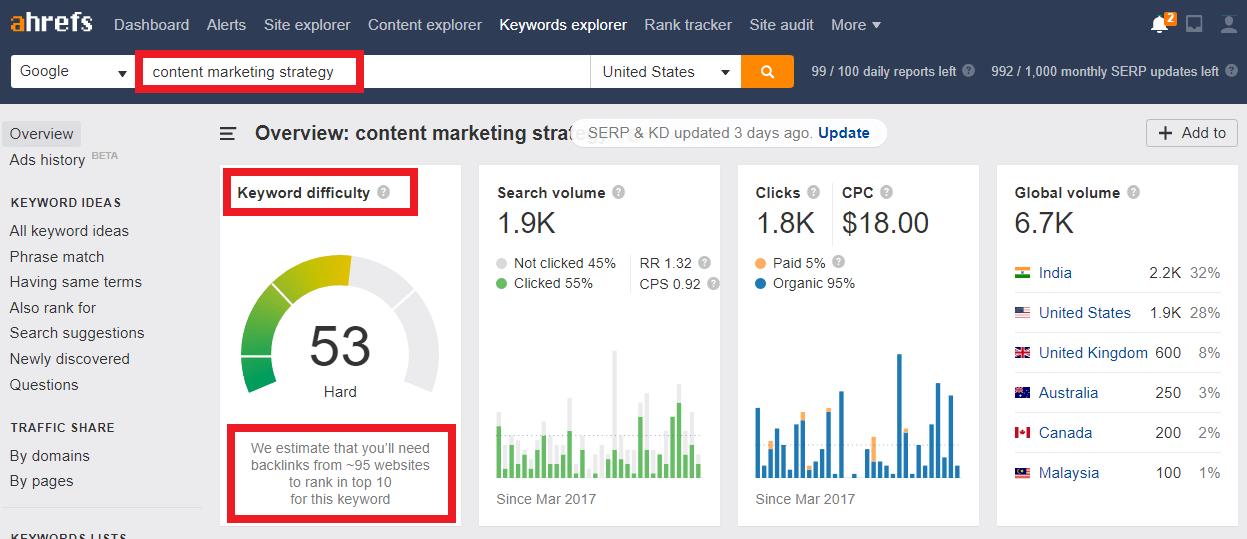
SEMrush
Using its Keyword Difficulty Tool, SEMrush can give you a percentage-based difficulty rating for individual keywords.
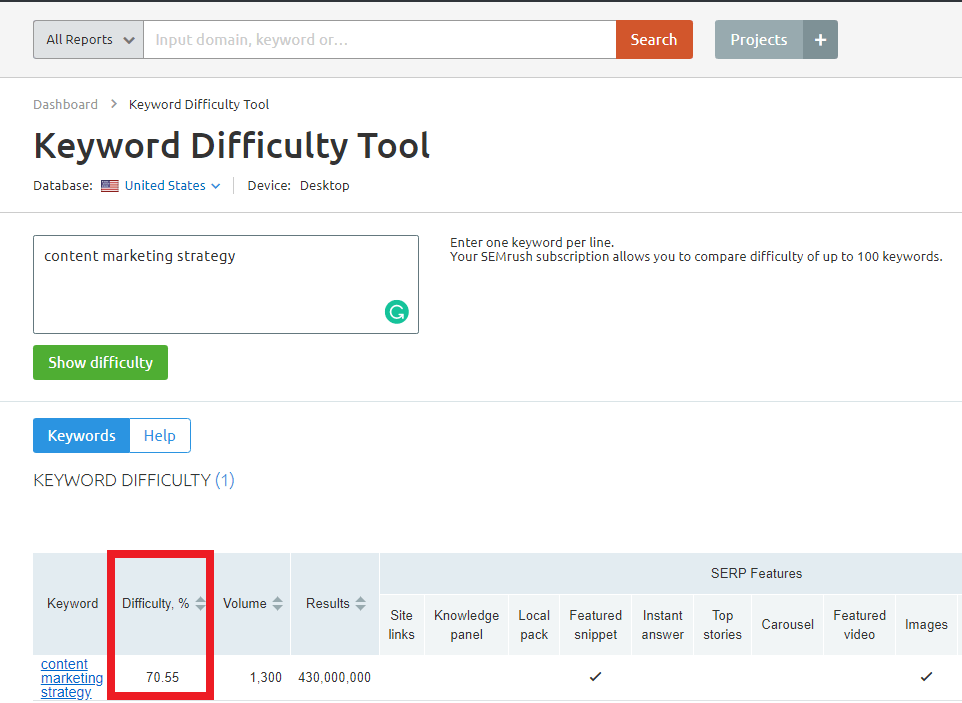
Since everyone wants to rank in the top ten, they tend to set their KD metric tool to range between 0 and 10. Afterward, they focus on integrating the easy key phrases into their platforms. However, avoiding the more difficult keywords is a big mistake, and here's why:
Researching high-KD terms as potential link targets: Having many backlinks on top-ranking sites is an indication that the subject you discussed is "link-worthy." Quite a few other individuals will probably link to you if you have something new to say about that subject.
You need to prioritize targeting high-KD keywords sooner rather than later. To rank for high-KD keywords, you'll need to spend a lot of time and energy building backlinks. So, the earlier you start dealing with those keywords, the better ranking your site gets.
Keep in mind that KD should not be used as an excuse to avoid keyword targeting. You can just use it to determine the "link worthiness" of a topic. It also helps you determine the effort required to achieve a high ranking for a specific query.
Search Volume
Search volume reveals the typical monthly occurrences of a keyword. The search volume metric can be broken down into four key components:
First, it's the total number of queries, not the total number of users, that matters. One user may use the same query several times per month. All of these searches, even if they're from the same user, add to the total number of times that keyword has been searched.
Second, even if you rank number one for a phrase with a lot of monthly searches, you won't get a traffic boost of more than 30 percent.
Third, monthly search volume is calculated as an average over the entire year. Thus, if a term receives 120,000 searches in December but none in the other 11 months, the monthly search volume recorded will be 10,000 (120,000/12 months).
Fourth, keyword tools typically only show search volume data for the selected country. However, some of them also provide you with the option of viewing the worldwide search volume. That is the total number of searches performed across all nations.
Applying Search Volume to Your Brand
Most keyword research tools let you narrow down your results by the search volume. In other words, it allows you to zero in on the most popular terms that your potential target audience searches for. There are two primary applications of search volumes:
- Eliminating extremely popular search terms: If you're just starting your brand, then keywords with 10,000 or more monthly searches are usually too competitive. So you shouldn't waste time researching them.
- Targeted keyword filtering for phrases with less search traffic: As a new brand, you should look for low-competition keywords. These are called long-tail keywords and they can help you get a little traffic
These long-tail keywords are common in search engine optimization, but most people don't pay attention to them. Most times, no one seems to be interested in a keyword unless it gets tons of searches every month.
As a start-up, if you rank for keywords with "zero search volume," you can expect to get only a few visitors monthly. The good thing is that your audience can grow from these few numbers! You might get highly targeted visitors a year if you create one hundred articles using these keywords.
So, long tail keywords are every bit as helpful as the more well-known alternatives. Since they are so specific, they are often even more useful than general phrases and words.
Another thing to keep in mind about search volumes is that they might differ from one tool to the next. This is because every tool uses its own methods to figure out and update search volumes.
Cost Per Click
The "Cost Per Click" (CPC) of a keyword shows how much an advertiser is willing to pay to get their ad at the top of relevant search results for that keyword. It's more of a metric for marketers than search engine optimizers, but it can be used as a rough estimate of a keyword's worth.
While monthly search volume tends to be fairly consistent, the cost per click (CPC) of a given term can fluctuate wildly. That's because more advertisers show up to bid on it. This means CPC figures in SEO tools are snapshots and not very accurate. So, it is recommended that you use Google Ads if you want real-time CPC data.
Traffic Potential
It's important to keep in mind that not everyone will use the exact same search terms when seeking the same information. Google fully understands this. As a result, it returns the same ranking for all these related search terms.
In other words, you can't just look at the search volume of a single phrase and assume that's how much traffic your page would get if it ranked for that keyword. Instead, you need to look at the top-ranked pages for that keyword. Then, access how much overall search traffic they get from all the many variations of that keyword for which they rank.
How to Target Keywords
A crucial part of keyword research is figuring out what kind of page you need in order to rank better. You need to figure out if you can use that website to simultaneously target multiple relevant keywords. If not, you'll need to create other pages that focus on specific keywords.
Deciding what you'll need to do with these keywords might seem like a long process, but it isn't. There are only two things you need to take into consideration. These include:
- Identifying the main Keyword
- Studying the user intent
Identifying the Main Keyword
Imagine that you have these keywords listed below:
- What is whipped coffee
- Whipped coffee recipe
- How to make whipped coffee
- Whipped coffee
Looking closely, you'll see that all the keywords have one thing in common: "whipped coffee." The question is, "Can you integrate all these keywords into one page?" Or, would you need different pages so you can target each one?
Your next steps depend on Google. First learn if Google considers them to be related to one another, or views them as distinct subjects. You can answer this by performing individual searches for these phrases.
Let's start by comparing the search results for "whipped coffee" and "whipped coffee without sugar."
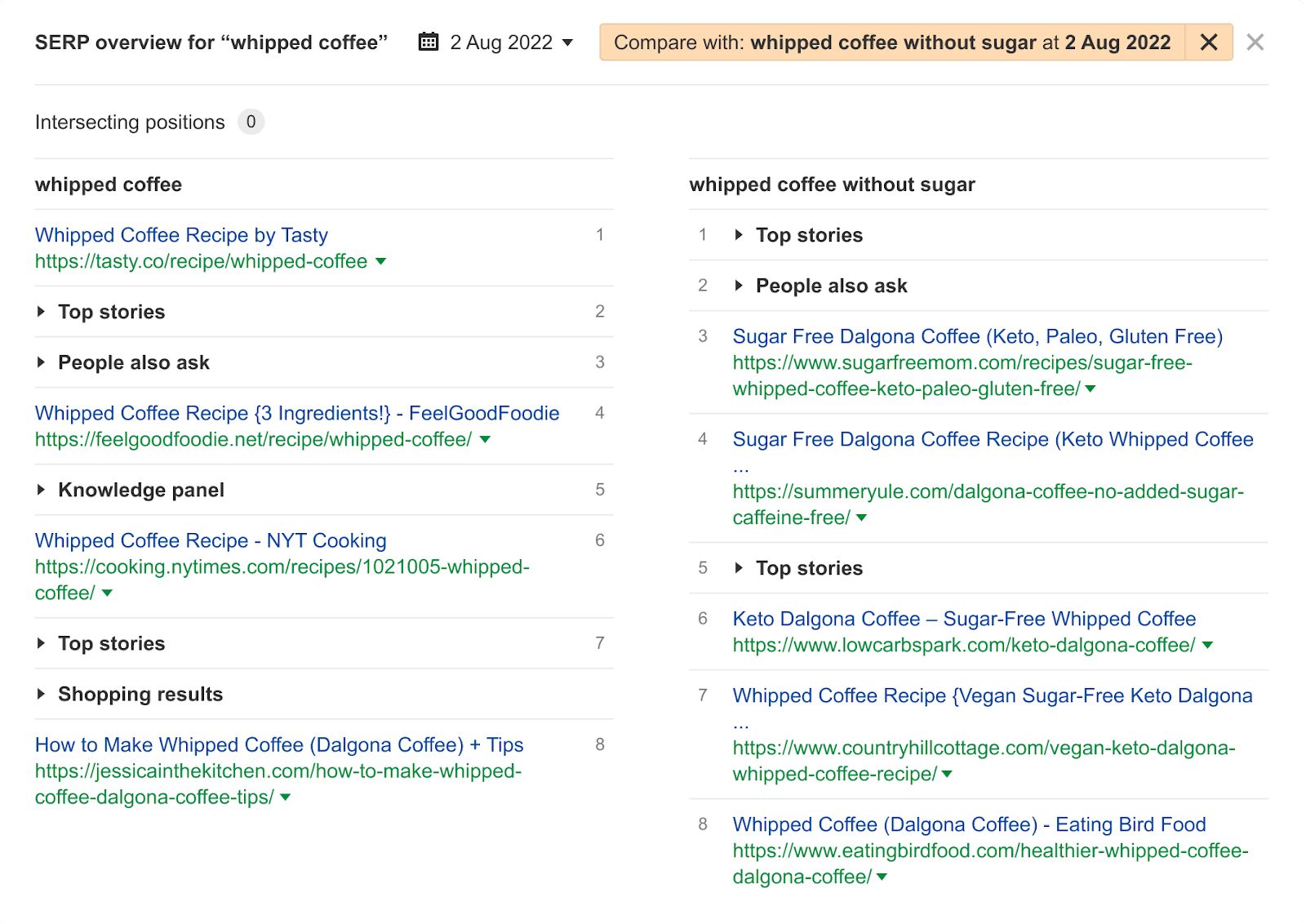
From the image above, you'll notice that the search engine results for both terms are different. This means that Google doesn't consider "whipped coffee without sugar" as a subset of "whipped coffee." So, if you want your site to rank for both terms, you'll need to create two different pages.
It's a different story when you compare the search results for "whipped coffee" and "whipped coffee recipe."
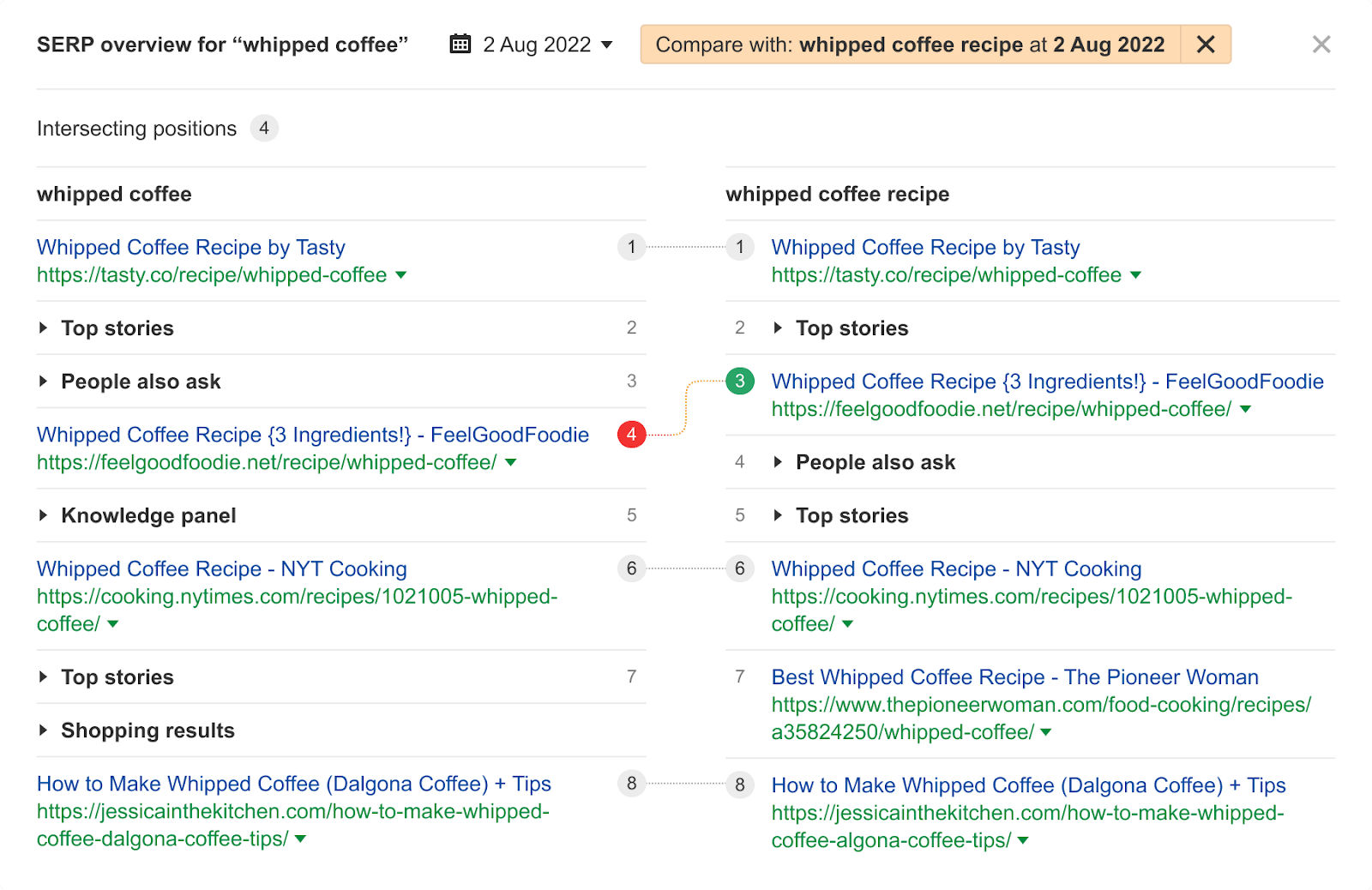
As you can see, the pages that rank for both topics are quite similar. This means that you can use those keywords on a single page and still get a good ranking.
From the examples above, it's easy to identify what the main and secondary keywords are. Before we continue, let's quickly explain the difference between types of keywords:
Main keyword
This term has the highest search traffic and represents the topic best. It's used in the main parts of the website, such as the URL, title tag, heading, etc. For instance, "whipped coffee" is the primary keyword in the comparison of "whipped coffee" and "whipped coffee recipe."
Secondary keyword
Although it is not your main keyword, it is a term within the same topic with a lesser search volume that you also want to rank for. One topic can contain several secondary keywords.
It could be hard to tell if a keyword is a primary keyword or a secondary keyword. Fortunately, Google has already made it easy; all you have to do is check out the results.
Consider the search term "how to soften dry dog food" as an illustration. To begin, let's check out this term in the Keyword Overview.
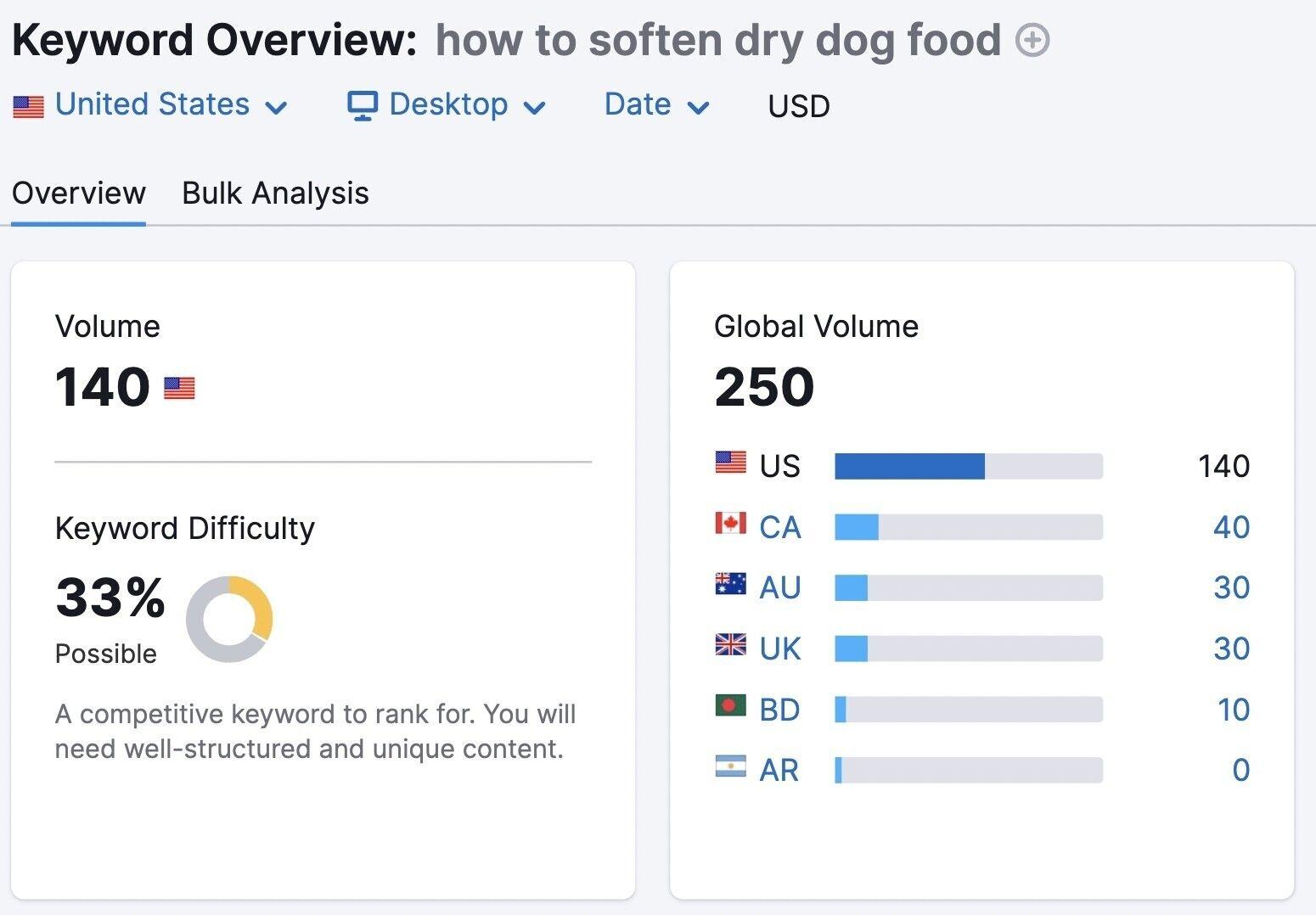
Then, scroll to the bottom of the page and look at the results under "SERP Analysis."
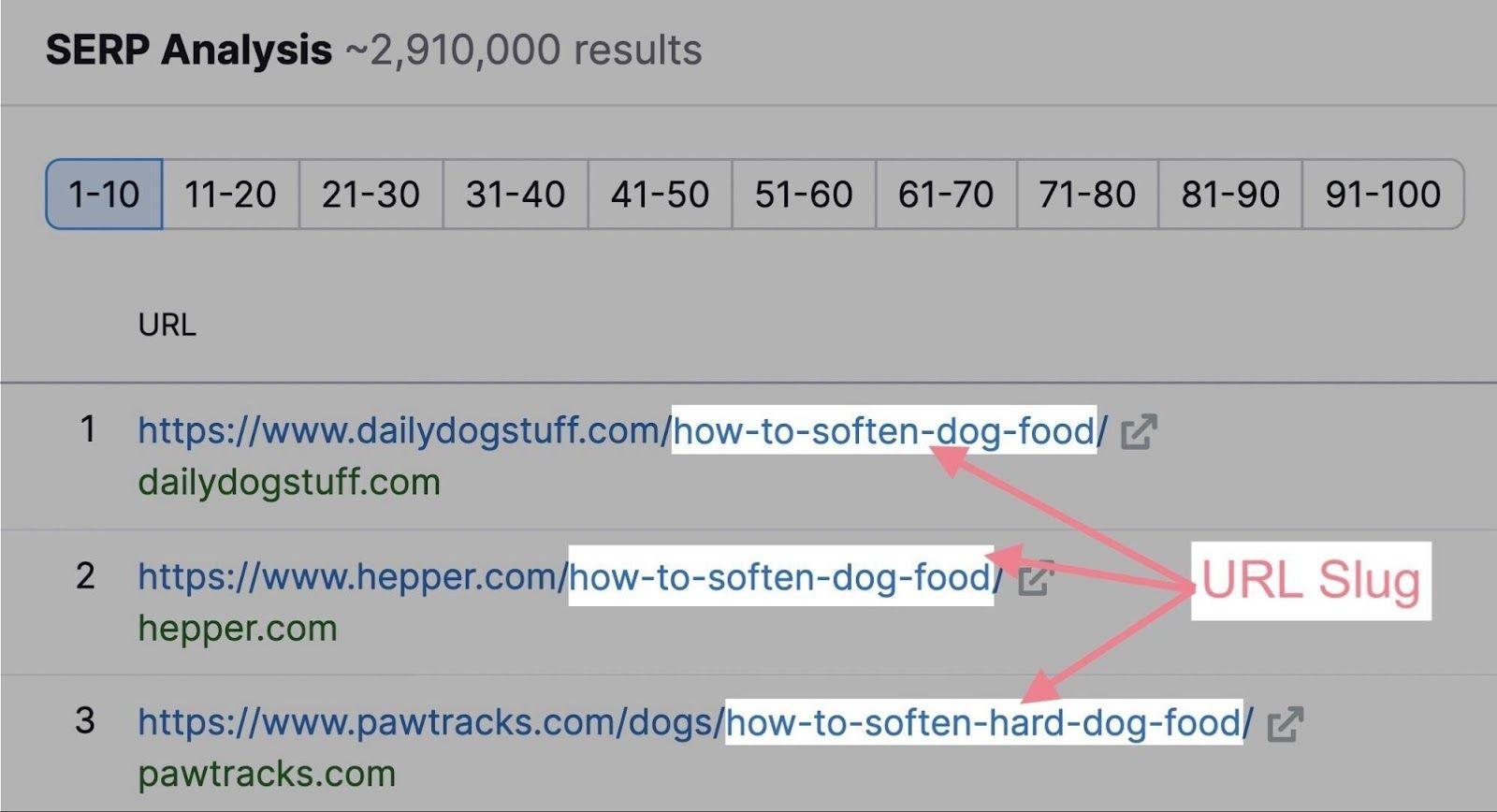
If you notice, the word "dry" is not included in any of the URLs. This is the first red flag that "how to soften dry dog food" is not the best target keyword.
Let's open the Organic Research System by clicking on the first URL.
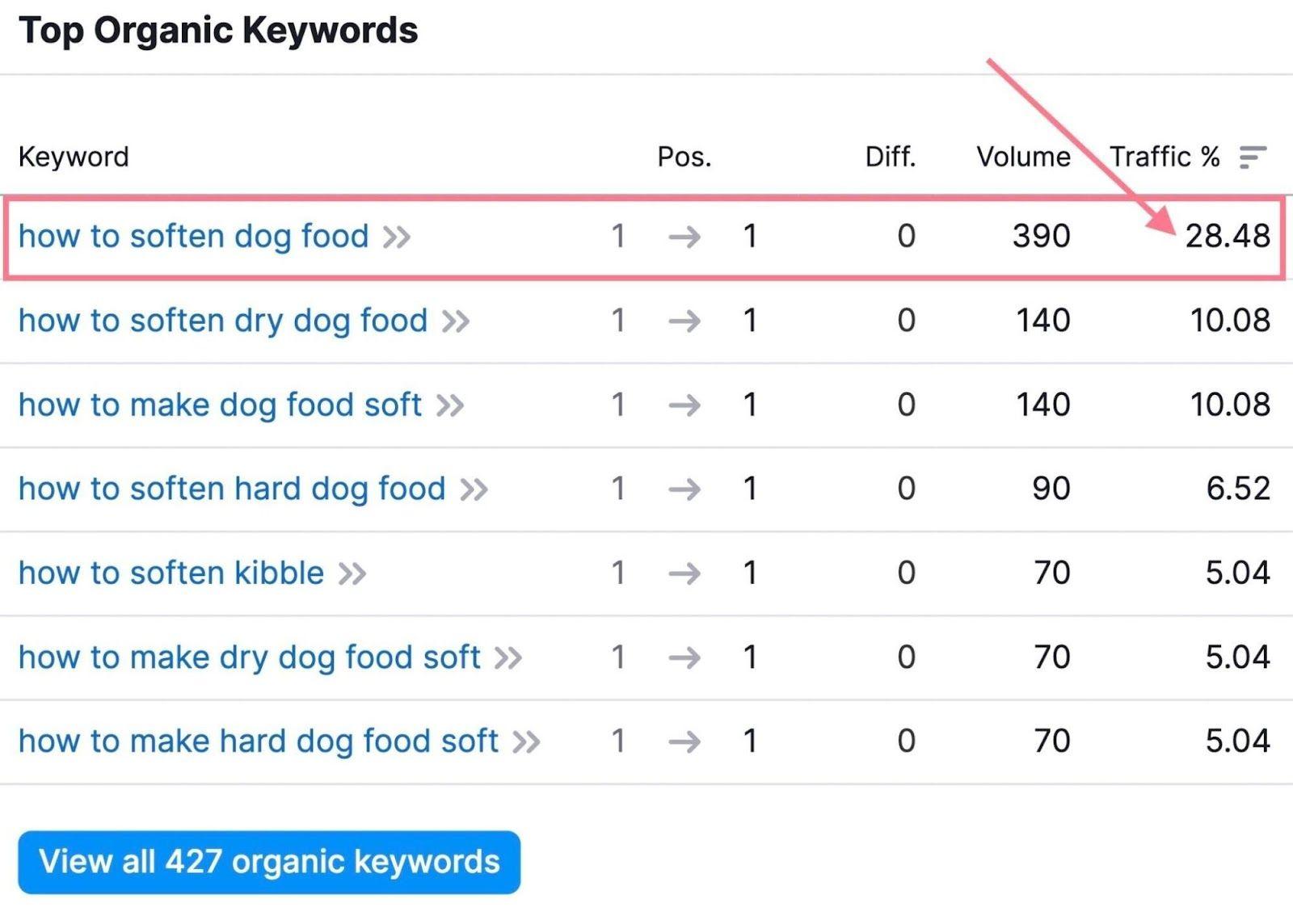
Looking at the most searched terms on that page will show that "how to soften dog food" is the most popular search related to this subject. Its search volume is higher, generating more clicks to the site.
Studying the User Intent
To compete for any keyword, you must first learn what people are looking for when they type that keyword into a search engine. That means asking why exactly they are looking for that keyword, as this can help you determine your next course of action.
Note that the search intent is divided into four categories:
- Informational: The user is searching for general information about a particular topic
- Commercial: In this case, users are checking out their options before deciding on what they want to buy.
- Navigational: The user is searching for a specific page.
- Transactional: Users search for a certain product with the intention of buying.
what to do with search intent
Assume you have the following keywords:
- How to brew cold brew coffee
- Arabica coffee
- Latte vs Cappuccino
- Coffee grinder
You must now decide whether your blog posts should focus on informing your readers or selling them anything specific. This is self-evident for a few categories of keywords. Search terms like "how to brew cold brew coffee" suggest that users are interested in instructions rather than a product. Therefore, you wouldn't use them to launch a sales page.
However, what about the term "arabica coffee" as a keyword? When conducting a search, do users have a need for knowledge or a desire to make a purchase?
Google seems to have ways to figure out which search results are the best for a given query. So, the most relevant page to the user's search will rise to the top of the list. Looking at the most popular results for a set of keywords can reveal the search intent behind those keywords.
That said, let's check out the organic search results for "arabica coffee."
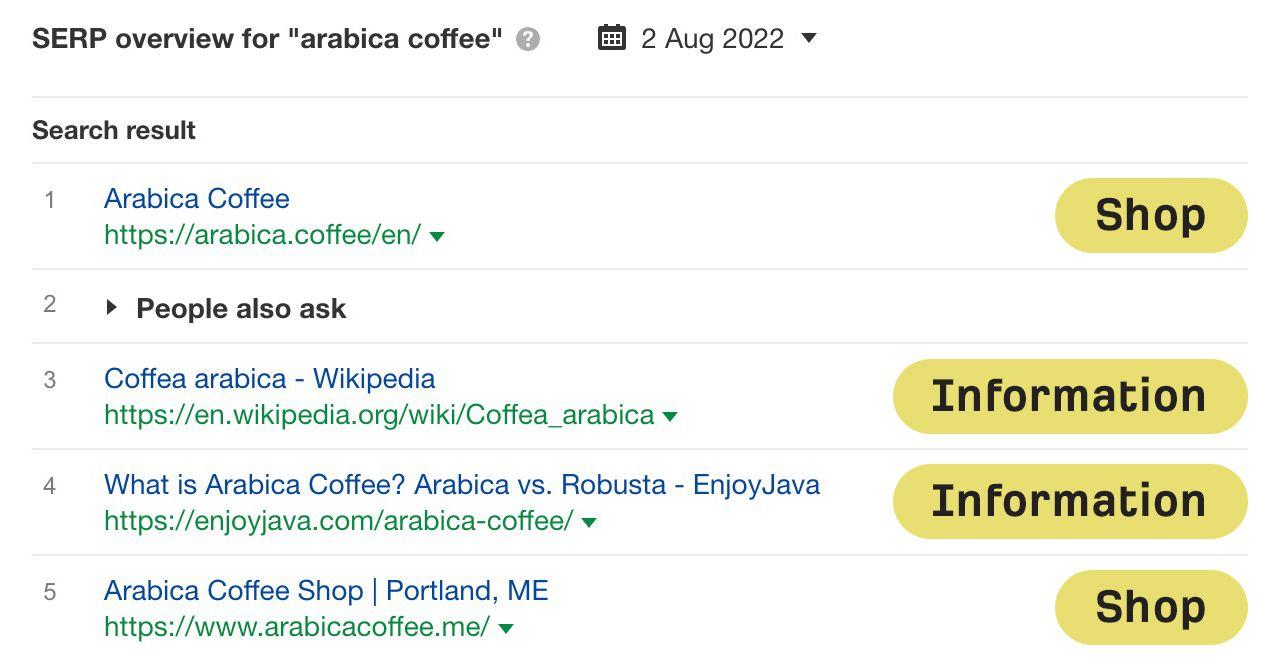
From the search results, you can find both informational and commercial websites on the first page. This is what SEO specialists refer to as "fractured search intent." It shows that both page styles can help you achieve a high Google ranking for this term.
Standing out from the competition with search intent
Second, consider how you can add value to your site and differentiate yourself from competitors. This could involve things like:
- Giving detailed discussion on the subject
- Taking a different approach
- Adding more information to the topic
- Making unique media like videos and page-specific images
Here's a good example. When you search for "how to make latte," you'll realize that one site discusses how to make it with an espresso machine. Meanwhile, another site took the approach of how to make the "perfect" latte.
In the first instance, the page included more details about “how to make latte” with an expresso machine However, in the second instance, the page took a whole new approach to make the same latte.
Prioritize Keywords

The hardest and most subjective part of researching keywords is deciding which ones to focus on first and which ones to ignore. There are too many factors to consider
- How many potential website visitors will this keyword get you?
- How difficult is it to rate these keywords? Which competitors do you face?
- What effort is needed to make a flawless page? Maybe you're working with an existing one that just needs tweaking.
- In a business context, how valuable is this keyword? Is there any benefit to being highly ranked for it?
That last bit of information is crucial. True, search volume, traffic potential, ranking difficulty, and the purpose of the search are all important. Nevertheless, you also need to think about what ranking for this keyword will mean for your business.
That said, we'll explore two major factors in this section. These include:
- How to determine the business potential of a specific keyword
- What keywords to start working on
Determining the Business Potential of Your Focus Keyword
Some marketers evaluate a keyword's potential by tracing its path through the buying process. The buyer's journey shows the steps people undergo before purchasing something. It is common knowledge that consumers are less likely to make a purchase at the beginning of their journey.
- Top of the funnel: Users are still exploring and looking for information about a subject.
- Middle of the funnel: They know what a solution to their problem should look like and are exploring different variants of it.
- Bottom of the funnel: These users have found a solution and want to buy a certain product or use a certain service.
TOFU (top of the funnel) keywords can give you good search volumes, but the conversion rate is low. On the other hand, BOFU keywords could give you a higher conversion, but the search volumes are much lower.
That's why it's not advisable to use the buyer's journey when prioritizing keywords. Instead, consider how easy it is to sell your products with different keywords.
What Keywords to Start Working on

As we already noted, there are tons of key phrases that you'll get from your research. Knowing which ones on your keyword list you should start working on is crucial, and this depends on a few factors:
- What website are you working on? Is it a recently launched website or an established company?
- Do you oversee a sizable staff of marketers, or are you the only one?
- Are you in charge of generating new leads for the sales team or the actual conversions?
- How soon must results be visible?
To conduct effective keyword research, you must strike a balance between your specific needs and the concepts we've discussed.
Sometimes, your task will be to get as much targeted traffic as quickly as possible. This will require you to identify keywords with a large search volume and a low level of competitiveness.
On the other hand, there will be instances when you need to prioritize leads or conversions over anything else. In this case, business potential will be your top priority.
Additionally, you ought to have short-, medium-, and long-term ranking objectives. If you focus on only one, you might not achieve exactly what you want for your website.
For instance, you won't ever rank for the most profitable keywords if you solely concentrate on short-term objectives. On the other hand, it will take years to see any traffic if all you concentrate on are your medium- and long-term objectives.
Keyword Research Tools

To make the entire research process a breeze, you need a keyword research tool. There are many of them, some of which are paid and others are free. If you're just starting out, you should experiment with free keyword tools. We have explained the best ones below:
Google Keyword Planner

This is the best keyword research tool for beginners. It's free to use even if you choose not to use Google Ads. So, you never need to worry about pricey upgrades. If you want to learn more about how to use it, check out our dedicated article.
Google Keyword Planner has two primary functions. The first is for broad, preliminary keyword research and discovery. The second is for targeted, in-depth analysis of search volume and projections.
The "Keyword ideas" feature allows you to search for a seed term to create related keyword suggestions. You can narrow down your list of keywords by brand names or non-brand names, source website, and more. If you also use Google Ads, the "Forecast" feature makes it easier to budget and plan ahead for your paid ads.
Google Search Console

You might find a wealth of useful keywords that you may not have targeted on your page in Google Search Console. These are the exact questions people are typing into search engines to find your website.
There may be some search terms for which the SEO tools provide either no data at all or very low search volume data. On the other hand, there could be a highly relevant search query that is receiving many clicks. If so, it's evident that many people are in fact entering that query into search engines. That way, you can tailor your page to it for maximum effectiveness.
Other Places to Find Relevant Keywords That Rank In Search Engines
Besides keyword tools, there are other places where you can find these keywords. They include:
Google Trends

Using Google Trends is an advanced way to find keywords. This tool can tell you how popular a keyword is over a certain amount of time and in a certain place.
Quora

In terms of overall website traffic, Quora is in the top 50 websites. There are many effective ways to use Quora for keyword research. However, one of the best things you can use it for is to learn what people truly want to know about a topic.
Conclusion
If you want to get traffic from search engines, you need to write about things that people are looking for. The only way to do this is to do keyword research.
There are many ways to start your keyword research. You can look at what search terms bring people to your competitors' sites or check discussion forums. There are also multiple tools that can help you through the process.
Now that you know all there is to know about keyword research for SEO, there's nothing stopping you from getting started. However, ensure you have ranking goals, as this will give you a direction to follow when researching keywords.


